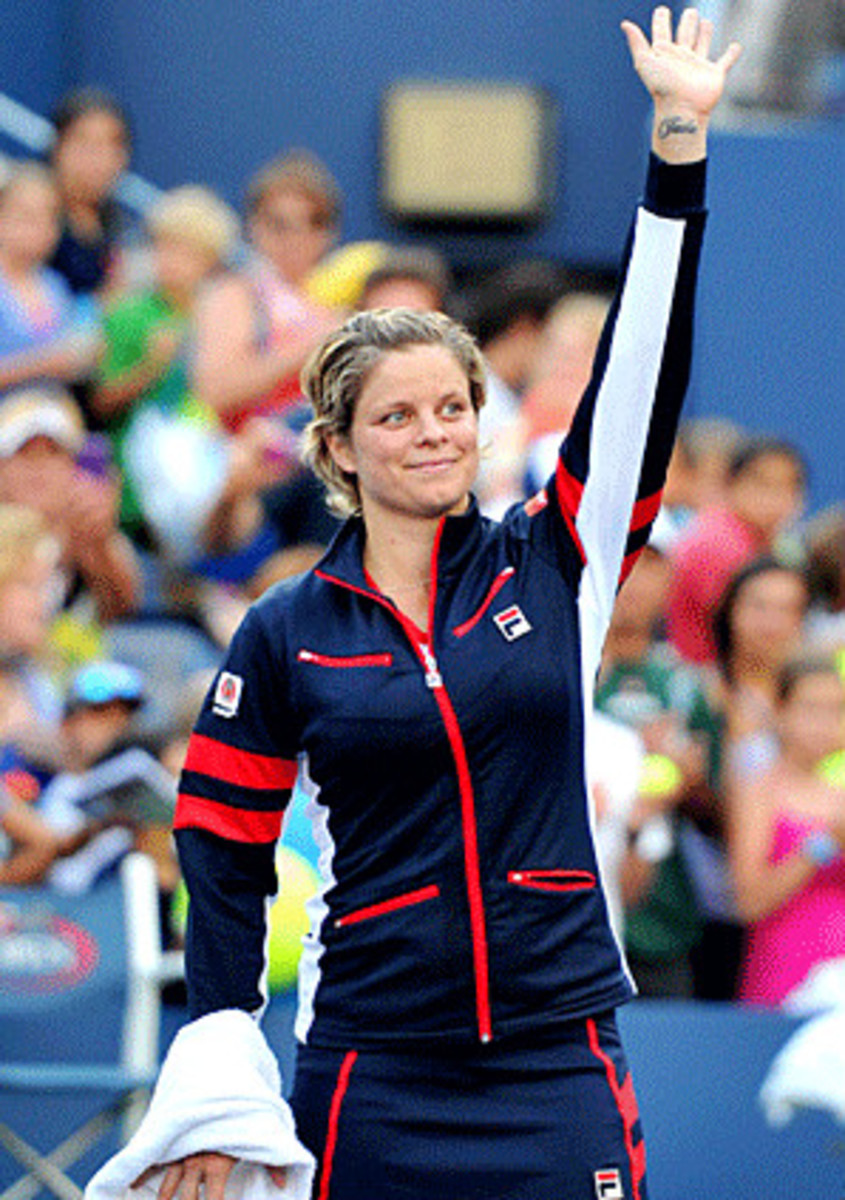Mental fortitude helped Clijsters stand tall against toughest of era
All this pertains to tennis because 1) tennis is closer to prizefighting than most in either sport care to admit and 2) Serena Williams is basically Mike Tyson if Tyson's career had continued on its meteoric trajectory and never descended into performance art. The 14-time Grand Slam champion is one of the most devastating, intimidating forces of this or any other generation, a master of the psychological component that often makes the difference in a sport where the disparity in skill between No. 1 and No. 50 is negligible.
Consider how many of Serena's opponents acquiesced before they even stepped on the court. Here's a partial list: Maria Sharapova, Dinara Safina, Victoria Azarenka (and those are just the former No. 1s!).
The one who didn't, of course, is Kim Antonie Lode Clijsters.
This information is no longer relevant in any competitive sense because Clijsters is now a former professional tennis player after Wednesday's second-round loss to Great Britain's Laura Robson. The 29-year-old Belgian, who announced in May the U.S. Open would be her final tournament, bowed in straight sets before a sparse late-afternoon crowd at Arthur Ashe Stadium. It marked the end of Clijsters' streak of 22 straight wins here, which spanned runs to the 2005, '09 and '10 titles. Remarkably, Robson was nine years old and Coupling was still on BBC Three when Kim last was beaten here.
Yet it's important, and must be written, because the tributes to Clijsters over the past week have missed the point in such a way that demands clarification.
Everyone keeps talking about how nice Clijsters was. Her legacy, it seems, will be her popularity.
What's been underplayed is the mental tenacity, the taste for combat, that made Clijsters one of the most ruthless competitors of her time. All the more praiseworthy in an era of one-slam wonders, dubious No. 1s and paper champions. And nowhere was this more evident than against Serena.
Incredibly, Clijsters and Serena met just once since 2003. That, of course, was the U.S. Open semifinal in 2009 known colloquially both in and out of tennis circles as the Take This F---ing Ball And Shove It Down Your F---ing Throat match. Clijsters had come back from a 27-month retirement, played two tournaments and was given a wild-card invitation to the U.S. Open. She hadn't even played the three events necessary to calculate an official ranking, much less earn her a seed; thus her ranking on all WTA correspondence throughout the tournament was three pound signs where the value would normally appear.
Serena was the No. 2 seed but, fresh off dominant runs to the Australian Open and Wimbledon titles, was widely expected to defend her U.S. Open title. She'd ripped through the draw without dropping a set, setting up a highly anticipated showdown with Clijsters, a match that didn't begin until 9:21 p.m. in a half-full Ashe Stadium thanks to day-long rain -- one of those bizarre episodes that engenders the Open's unique identity.
What still resonates three years later is the look on Clijsters' face -- those cold, dead eyes. It's hard to imagine what Serena felt when confronted with an opponent she couldn't hit through, who returned her formidable fire with crushing groundstrokes off both wings. The nice girl from Bree was asking questions for which Serena, for the first time in what seemed like a lifetime, had no answers. Williams' frustration was palpable even before she mangled her racket with two violent blows after dropping the first set.
It ended famously. Serena's tantrum was no different than a fighter looking for a way out, the tennis equivalent of Tyson biting Evander Holyfield's ear. And that was Clijsters' crowning achievement, perhaps more than her brilliant shotmaking. She made Serena tap out mentally.
The only real tragedy from a tennis standpoint is the TTFBASIDYFT match was the only meeting between Clijsters and Serena, arguably the two best players of the past decade, in the past nine years. Kim might have been friendly in the locker room, but her game was hardly all sunshine: she snarled, she growled, she looked pissed. And her opponents felt it.
Now Clijsters' lifetime record against Serena -- two wins and seven losses -- might not reflect any degree of superiority. Nor should it, even if eight of those nine matches took place before Clijsters had peaked. But a player can have a losing head-to-head record against an opponent and not just roll over. Clijsters never compromised her game the way, say, Azarenka tones it down when opposite Serena.
Nice was often a backhanded compliment during the first act of Clijsters' career, when she reached No. 1 in 2003 only to be hamstrung with the dreaded Best Player to Never Win a Major millstone. The rap on Clijsters was that she lacked the temperament to win a Grand Slam, her inherent affability often interpreted as a lack of hunger or killer instinct. Her mental fortitude was questioned further when she retired at 23, ranked No. 5 on the tour, with $14.7 million in career earnings plus millions more in endorsements. "Time for marrying," she wrote on her website. "Children? Time for cooking and playing with the dogs."
Yet any doubts that lingered over Clijsters' taste for the fight were buried that night deep under the DecoTurf on Ashe.
Nice.
It appears awfully lame that Clijsters seems destined to be remembered for a quality, while rare in the echo chamber of professional tennis, that's essentially just basic human decency, instead of the extraordinary mental tenacity common to only the greatest individual athletes -- be they fighters, tennis players, gymnasts or chess grandmasters.
We all know Clijsters was friendly, the prodigy from Belgium who envisioned herself as Steffi Graf and Monica Seles. Yet it was her ability to stand tall against the best of her era that's made her legacy unassailable.





